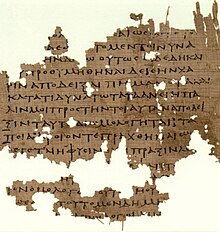
In Plato's The Republic, a noble lie is a myth or a lie knowingly propagated by an elite to maintain social harmony.[1] Plato presented the noble lie (γενναῖον ψεῦδος, gennaion pseudos)[2] in the fictional tale known as the myth or parable of the metals in Book III. In it, Socrates provides the origin of the three social classes who compose the republic proposed by Plato. Socrates proposes and claims that if the people believed "this myth...[it] would have a good effect, making them more inclined to care for the state and one another."[3]
- ^ Brown, Eric (2017), "Plato's Ethics and Politics in The Republic", in Zalta, Edward N. (ed.), The Stanford Encyclopedia of Philosophy (Fall 2017 ed.), Metaphysics Research Lab, Stanford University, retrieved 2019-11-26
- ^ Translator Allan Bloom explains, "The word is generation which is, primarily, 'noble' in the sense of 'nobly born' or 'well bred'..." and refers to Plato's Republic 375a and 409c for comparison (p. 455 n. 65, The Republic of Plato, 2nd edition, New York: Basic Books, 1991).
- ^ Book 3, 415c–d